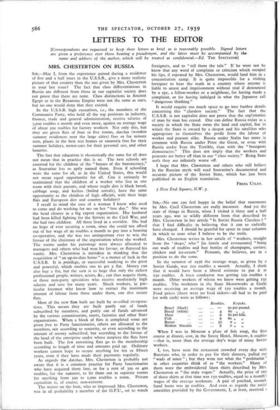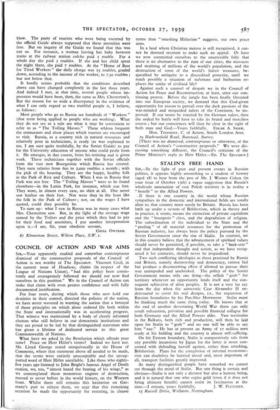LETTERS TO THE EDITOR
[Correspondents are requested to keep their letters as brief as is reasonably possible. Signed letters are given a preference over those bearing a pseudonym, and the latter must be accompanied by the name and address of the author, which will be treated as confidential.—Ed. THE SPECTATOR]
MRS. CHESTERTON ON RUSSIA
SIR,—May I, from the experience gained during a residence of five and a half years in the U.S.S.R., give a more realistic picture of that country than the one given by Mrs. Chesterton in your last issue? The fact that class differentiations in Russia are different from those in our capitalist society does not prove that there are none. Class distinctions in Ancient Egypt or in the Byzantine Empire were not the same as ours, but no one would deny that they existed.
In the U.S.S.R. high executives, i.e., the members of the Communist Party, who hold all the top positions in industry, finance, trade and general administration, receive salaries of 5,000 roubles a month and even more, against an average wage of about 200 roubles for factory workers. Not only this, but they are given flats of four or five rooms, datchas (wooden summer residences near the large cities) free or for minute rent, places in the best rest homes or sanatoria free for their summer holidays, motor-cars for their personal use, and other luxuries.
The fact that education is theoretically the same for all does not mean that in practice this is so. The best schools are reserved for the children of the "boyars of the bureaucracy," as Souvarine has so aptly named them. Even if schooling were the same for all, as in the United States, this would not mean equal opportunity for all. Can it seriously be maintained that the children of a worker who live in one room with their parents, and whose staple diet is black bread, cabbage soup, and kashas (boiled cereals), have the same opportunity as the children of high officials, with their large flats and European diet and country holidays?
I recall to mind the case of a woman I knew who used to come and do washing for me on her " free day." She was the head cleaner in a big export organisation. Her husband had been killed fighting for the Soviets in the Civil War, and she had two children. All three lived in a corridor. She had no hope of ever securing a room, since she could not afford out of her wage of 90 roubles a month to pay into a housing co-operative, and she was too unimportant ever to win the favour of the chairman of the organisation where she worked. The rooms under his patronage were always allocated to managers and others who had won his favour, or flattered his vanity. Mrs. Chesterton is mistaken in thinking that the acquisition of "an up-to-date home" is a matter of luck in the U.S.S.R. It is privilege, or successful toadying to the great and powerful, which enables one to get a flat. Money can also buy a flat, but the sum is so large that only the richest professional people, writers, actors, &c., can thus acquire them, or those non-party specialists who receive moderately high salaries and save for many years. Shock workers, in par- ticular foremen who know how to extract the maximum amount of labour from those under them, can also secure flats.
Most of the new flats built are built by so-called co-opera- tives. This means they are built partly out of funds subscribed by members, and partly out of funds advanced by the various commissariats, trusts, factories and other State organisations. When a block of flats is completed some are given free to Party functionaries, others are allocated to the members, not according to seniority, or even according to the amount of money subscribed, but according to the favour of the head of the enterprise under whose auspices the flats have been built. The few remaining flats go to the membership according to length of time and amounts paid up. Ordinary workers cannot hope to secure anything for ten or fifteen years, even if they have made their payments regularly.
As regards the datchas, Mrs. Chesterton is probably not aware that it is a common practice for Party functionaries who have acquired them free, or for a rent of 300 or 400 roubles, for the summer, to let them out in separate rooms for anything from 500 to i,000 roubles a room. Private capitalism is, of course, non-existent.
The waiter on the boat, who so impressed Mrs. Chesterton, was in all probability a member of the G.P.U., set to watch foreigners, and to " tell them the tale." If he were not he knew that any word of complaint or criticism which escaped his lips, if repeated by Mrs. Chesterton, would land him in a concentration camp. It is quite impossible for a visiting foreigner to hear the truth in a country where anyone is liable to arrest and imprisonment without trial if denounced by a spy, a fellow-worker or a neighbour, for having made a complaint, or for having indulged in what the Japanese call " dangerous thinking."
It would require too much space to go into further details concerning this " classless society." The fact that the U.S.S.R. is not capitalist does not prove that the exp!oitation of man by man has ceased. One can define Russia today as a society in which the State owns the land and capital, but in which the State is owned by a despot and his satellites who appropriate to themselves the profit from the labour of worker and peasant alike. Russia under Stalin has more in common with Russia under Peter the Great, or even with Russia under Ivan the Terrible, than with the " bourgeois democracies." This does not imply that the workers and peasants are better off than in our " class society." Being State serfs they are infinitely worse off.
I hope that Mrs. Chesterton and others who still believe in the Russian myth will read Souvarine's documented and accurate picture of the Soviet State, which has just been published in an English translation.
5 New End Square, N.W. 3.
FREDA UTLEY.
SIR,—No one can feel happy in the belief that statements by Mrs. Cecil Chesterton are really incorrect. And yet the state of things in Russia, when I visited it three and a half years ago, was so wildly different from that described by Mrs. Chesterton in her article " Is Soviet Russia Classless ? " that I find difficulty in believing that it can so radically have changed. I should be grateful for space in your columns in which to state what I believe to be the truth.
Mrs. Chesterton writes in her article of " workers, straight from the shops,' who " [in hotels and restaurants] " bring out wads of roubles and buy bottles of champagne, caviare, chicken and ice-cream." Peasants, she believes, are in a position to do the same.
In the summer of 1936 the average wage, as given by a Soviet Guide, was 200 roubles a month. Actually, I think that it would have been a liberal estimate to put it at 15o roubles. A train conductor was getting zzo roubles a month. Other workers of whom we knew were getting 535 roubles. The workmen in the State Motorworks at Gorki were receiving an average wage of 15o roubles a month. Food prices (there were no food tickets—all had to be paid for with cash) were as follows :
Roubles. Kopeks.
Bread (black) — 90 per pound.
Bread (white) 60 11 33 Meat • • • 9 6o per kilo.
Fish ... 60 13 )3 Butter ••• 35 o„ If Broken biscuits o„ ,,
When I was in Moscow a plate of fish soup, the first course at dinner, cost, in the Savoy Hotel, Moscow, 6 roubles —that is, more than the average day's wage of many Soviet workers.
I, too, have seen the restaurant crowded every day with Russians who, in order to pay for their dinners, pulled out " wads of notes " ; but they were not what the " proletariat " in other countries think of as " the workers." Many of them wore the embroidered linen shirts described by Mrs. Chesterton as " the male vogue." Actually, the price of one of those shirts at that time was iso roubles, equal to a month's wages of the average workman. A pair of patched, second- hand boots was 3o roubles. And even as regards the social amenities provided by the Government, I, at least, received a
blow. The party of tourists who were being escorted by the official Guide always supposed that these amenities were free. But on inquiry of the Guide we found that this was not so. For instance, a woman leaving her baby between trains at the railway station creche paid 1 rouble. For a whole day she paid 3 roubles. If she and her child spent the night there, she paid 7 roubles. At the " Home of Rest for Tired Workers " the daily charge was 15 roubles, graded down, according to the income of the worker, to 7.5o roubles ; but not below that.
It hardly seems probable that the conditions described above can have changed completely in the last three years. And indeed I met, at that time, several people whose im- pression would have been, then, the same as Mrs. Chesterton's. But the reason for so wide a discrepancy in the evidence of what I can only regard as two truthful people is, I believe, as follows: Most people who go to Russia see hundreds of " Workers " (that term being applied to people who are working). What they do not see as a rule are what it may be convenient to refer to as " The Toiling Masses." These seldom frequent the restaurants and show places which tourists are encouraged to visit. Russia, as a country rich in natural resources and relatively poor in technicians, is ready (as was explained to me, I am sure quite truthfully, by the Soviet Guide) to pay for the University education of anyone who could profit from it. He emerges, in due course, from his training and is given work. These technicians together with the Soviet officials form the vast new Bourgeoisie which Russia has created. They earn salaries from boo to 2,000 roubles a month ; with the pick of the housing. They are the happy, healthy folk in the Park of Rest and Culture. When I was in Russia that Park was not free. The "Toiling Masses" were to be found elsewhere—in the Lenin Park, for instance, which was free. They wore, in almost every case, no shirt at all. One never saw leather on their feet. Nor were they in the least like the folk in the Park of Culture ; nor, on the wages I have quoted, could they possibly be.
To sum up : what I saw in Russia was in many cases what Mrs. Chesterton saw. But, in the light of the average wage earned by the Toilers and the price which they had to pay for their food and amenities, I put another interpretation upon it.—I am, Sir, your obedient servant,









































 Previous page
Previous page